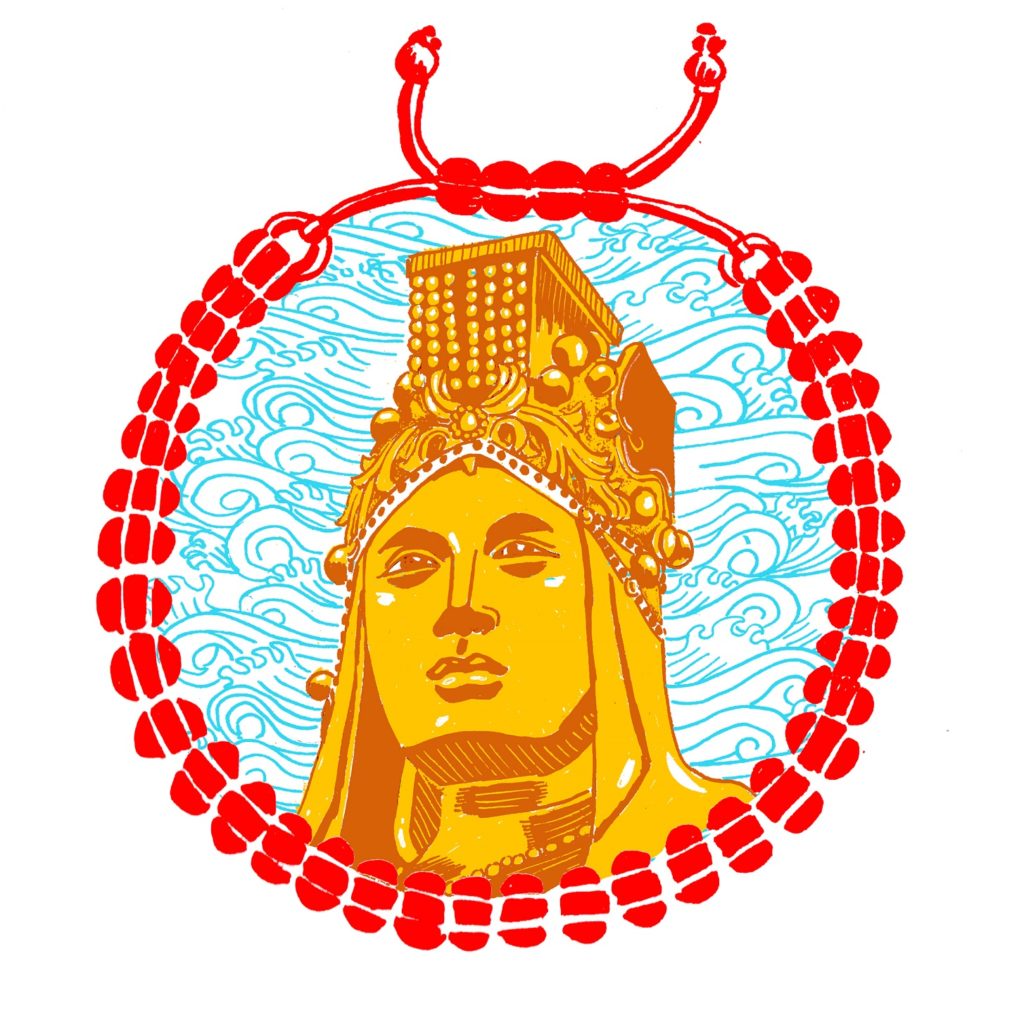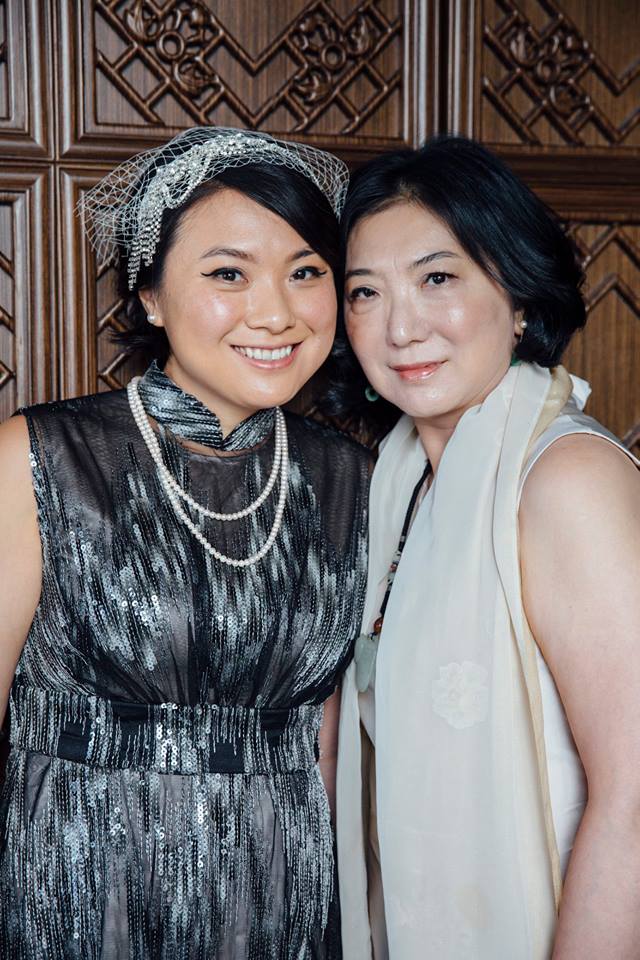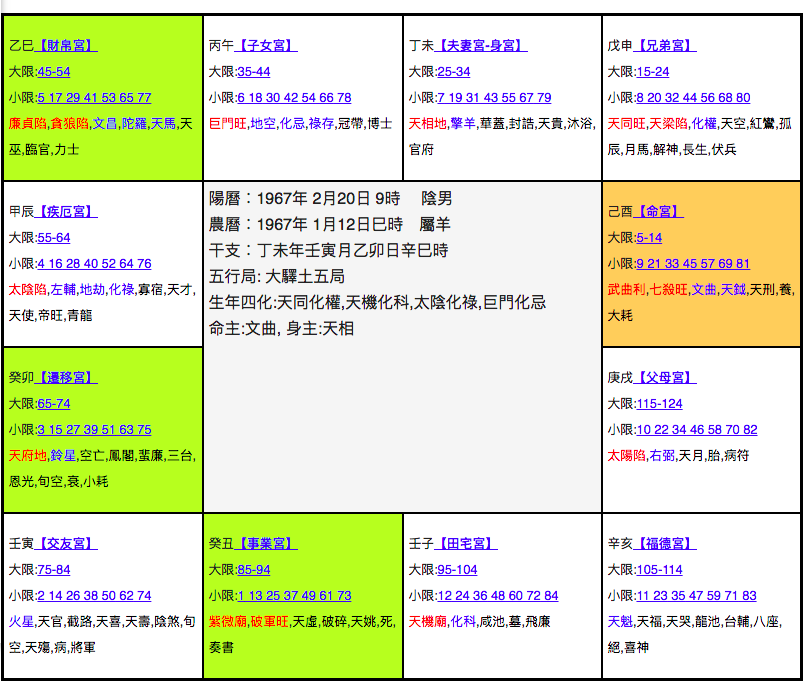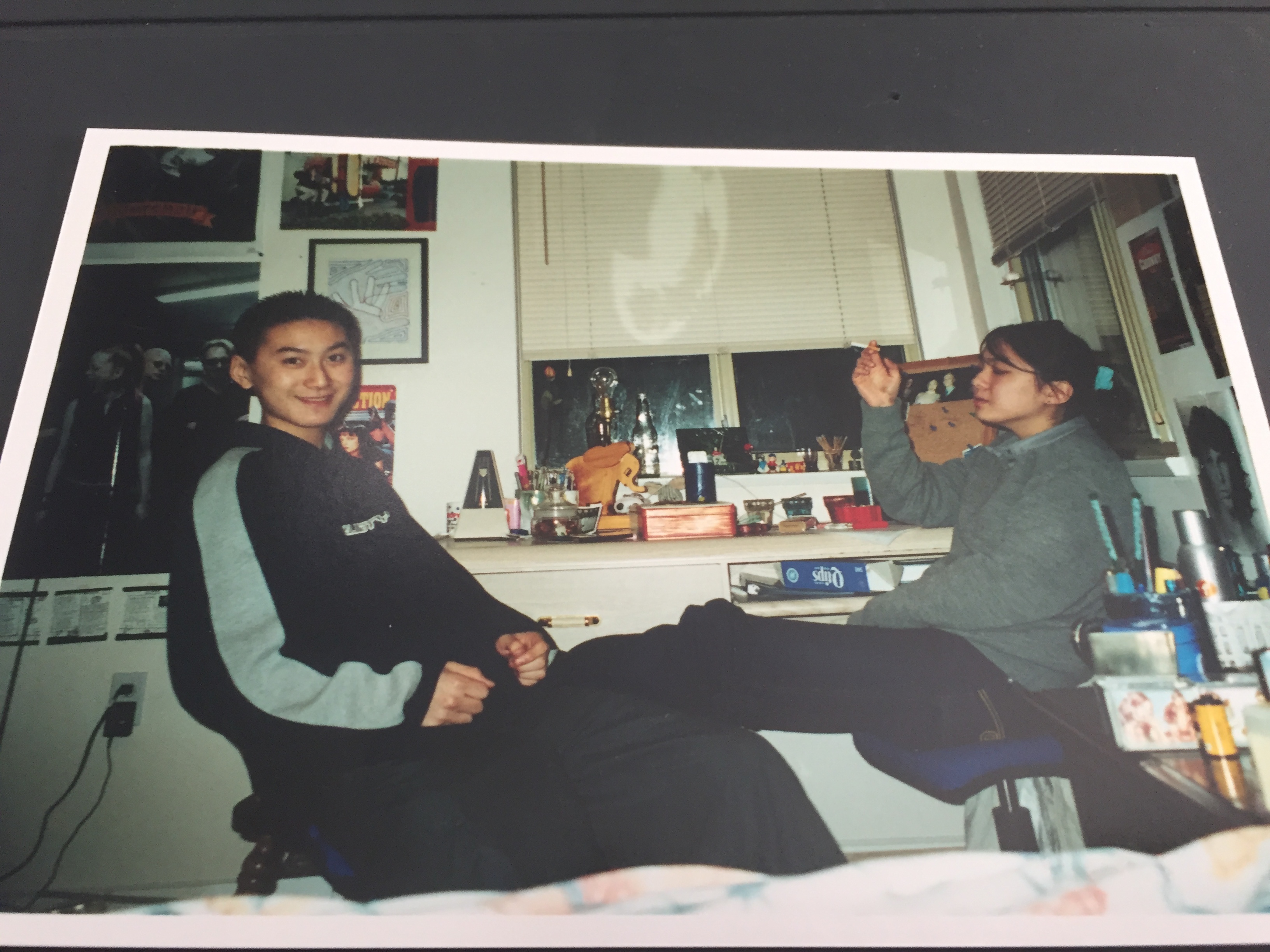This essay was originally published by The Normal School on April 21, 2020.

When I was 18, I crashed my car for the third time. My mother shook her head and said, “I should have listened to the fortune teller. He did tell me not to let you drive.”
My mother’s words echoed in my mind at the 2018 Microwave International New Media Art Festival in Hong Kong. I was standing before “RuShi” (2018), created by Hong Kong-based artist John Wong. It is an immersive installation that applied the algorithm of Bazi, the eight characters assigned to the birth year, month, day, and hour in Chinese fortune-telling. After entering my name, the date, and the hour of my birth on an iPad that was part of the installation, I walked into a dark room surrounded by curtains. I studied a projection consisting of eight squares, all flashing with horizontal and vertical threads of electrical lines in different colors. They appeared from different sides of each square, and as they moved across the projection, they gradually intersected. The result was a mesmerizing neo-noir tartan pattern that was supposed to represent my Bazi. I squinted my eyes and stared at the projection, hoping to glean some meaning from it. I could not.
Where were the prophetic narratives that were supposed to guide my future? When I was young, the westernized and feminist in me scoffed when my mother mentioned anything the fortune teller had said, especially the fortunes about me. Like many Asian-Canadians growing up in suburbia of the Greater Vancouver area in the 1990s, I tried to blend into my Anglo-Canadian surroundings. Mama’s nonsensical reasoning to take away driving and the freedom that came with it was unimaginable to my teenage brain. Ironically, I did give up driving—not because of what the fortune teller had said, but mainly because my insurance had become unaffordable after so many car crashes. I moved to the city where I could access public transportation to attend university.
“RuShi” is the first of Wong’s Immersion/Decentralisation (迷/信) series. In his artist statement, he claims that Bazi, often used by the Chinese to predict the future and help navigate life, is a form of big data. Therefore, he says, big data could potentially become the religion of the age of new media. The starting point of “RuShi” is Bazi, which is a familiar concept to me— like ziweidoushu, an astronomy-based system of fortune-telling— Bazi is a common form of Chinese superstition. These practices provide believers with a narrative of their past and prophesize the direction of their lives. My mother has been a believer in these practices for as long as I can remember. In Wong’s work, however, I did not see any narratives or anything familiar. By digitizing the ancient algorithm and turning it into an unrecognizable form, Wong erased the cultural references associated with Bazi and left me with a void filled with meaningless lines.
The artwork made an impact on me. I thought about it for many days as I started to question my own confused reaction to the work. As a Taiwanese Canadian, I was raised with the belief that mainland China (中國), or the “Middle Kingdom,” cannot be trusted. Its ruling party, the Communist Party of China (CPC), has always viewed Taiwan as one of its wayward provinces, a thorn in its ‘One China’ doctrine. It has been trying to claim Taiwan since the CPC defeated the Nationalists, the Kuomintang, in 1949. When I was a child, I often overheard the grown-ups lamenting that the communists would eventually destroy Taiwan’s independence. My experience with “RuShi” somehow indirectly reinforced my sense of impending doom, but it took me almost a year to confront and analyze my fears.
Fast forward one year, the Middle Kingdom has been increasingly casting its shadow over Hong Kong, the city I have called home for the last seven years. Since June of 2019, Hong Kong has become entrenched in political turmoil. The major event to ignite the recent protests is when Carrie Lam, the Chief Executive of Hong Kong, proposed the extradition bill in early 2019 as a response to a gruesome murder that took place in Taiwan. She claimed that if this bill passed, it would allow Hong Kong to extradite a murderer—a Hong Kongese man who had killed his pregnant girlfriend—to Taiwan. This bill would enable Hong Kong to surrender fugitives to be extradited to other countries it does not have agreements with, including Taiwan, Macau, and mainland China. There is no inherent problem with transferring a murderer from Hong Kong to Taiwan, as both countries have functioning courts. However, the prospect of being tried in mainland China is terrifying—its courts have a dubious track record for respecting human rights and have a conviction rate of 99.9%[1]. In other words, this bill opens up the possibility that anyone Beijing deems unsavory, such as activists, journalists, or even business executives, could face the opaque justice system in mainland China. Therefore, Hong Kongers from all walks of life, from university students to senior citizens, civil servants to mothers, have marched against it. At first, the protests were calm and imbued with a sense of optimism. However, as the government continued to ignore their demands, the tension escalated, and violence erupted. The once orderly city has become a scene of bloodshed and in its wake, turned a bustling metropolis into a ghost town.
Back in 2018, I couldn’t have predicted the protests that would break out a year later, but I viscerally knew that “RuShi” represented more to me than what I saw. This feeling intensified in recent months as I have witnessed the erosion of Hong Kong’s freedom of speech and assembly. I have also started to worry about Hong Kong’s culture as a world city and its freewheeling way of life. At first, the artwork did not sit well with me. For something that is based on Bazi, I expected the work to give me a prediction. After all, that was the point of Bazi— to reveal my destiny. However, I have recently come to understand that the artwork also represents my fears—a future devoid of freedom of expression and diversity of culture. I fear that if the CPC has its way, it will fill Hong Kong with distracting and meaningless lines, a busy illusion like in “RuShi.” The more I think about it, the more I understand what is at stake.
I have found it helpful to frame my newfound stake in Roland Barthes’ idea of punctum, which describes a “special acuity” in photography[2]. To Barthes, the punctum is a “sting, speck, cut, little hole—and also a cast of the dice.” A photograph’s punctum is often a result of an accident, creating details that enable the viewer to think beyond the image and to imagine the moment before or after the picture was made. What Wong’s work was missing, was the punctum of Bazi. More specifically, the work took away the superstitious elements of a cultural practice. Though I resented Taiwanese superstitions as a young person and still have my reservations about them, I do have many memories associated with them.
When I was a baby, a fortune teller told my mother that I should delay marriage, that I would not be happy if I married ‘too early.’ He did not give my mother a specific timeframe, but this may be the reason Mama never approved of any of my boyfriends. When I was 17, my Hungarian-Canadian boyfriend bought me a bouquet that contained a white carnation, among other vibrant flowers. “Is he cursing me to die?” she yelled, “tell him to never give you white flowers!”
Mama’s words illustrate how many Taiwanese people, even when they have immigrated to Canada, hold their superstitions dear. Mama did not want to see white flowers because white is the color of death. But how would an 18-year-old Canadian boy, whose family fled Communist Hungary when he was a toddler, know anything about the role of white flowers within Chinese superstition?
The word ‘superstition’ in the Chinese language is ‘迷信’ or mixin, consisting of the characters of “lost” and “faith” or “belief.” In other words, someone who is lost in their faith or belief is superstitious. Mixin is often lumped in with the Chinese folk religion rituals, a complex combination of teachings from Confucianism, Taoism, and Buddhism. Unlike Abrahamic religions, the Chinese folk religion has no canonical text, nor is there any congregation. Each family has its own practices that take place at home altars or in temples. There are two layers of Chinese folk religion. The communal layer consists of local deities such as an earth god, a city god, and Mazu, the patron goddess of the sea. This layer also includes ancestor worship and its rituals, derived from the Confucian teachings of filial piety, the virtue of respecting one’s elders and origins. The individual layer of the Chinese folk religion consists of supernatural beliefs and practices that include a wide variety of fortune-telling practices, such as Bazi and ziweidoushu. In addition to the two layers, many Taiwanese people, my family included, also follow a school of Buddhism, worshipping deities such as the Buddha, the Enlightened One, and Guanyin, the bodhisattva, or the goddess of compassion and mercy. These mixin provide Taiwanese culture with a sense of time, a narrative, and that particular little ‘sting’ that makes me pause and think.
However, as a Canadian teenager in the 1990’s, I did not appreciate the quirkiness of my Taiwanese culture or how meaningful it was to have one outside of the dominant Anglo-Canadian ethos. Now, perhaps because I am getting older and have lived in East Asia for over seven years, I have started to develop an affection for my mother’s mixin, which to me, has become the punctum of my Taiwanese culture. When I saw “RuShi,” I could not understand or articulate my reaction, and why the technologically driven iteration of my destiny troubled me so. After months of contemplating, I have realized that despite my dismay about Chinese superstition as a young person, I still associated Bazi as a part of the Chinese folk religion, which is something sacred. To me, technology in places of worship felt unnatural. Seeing my Bazi displayed in lines on a projection is perhaps equivalent to praying before a digital recreation of Jesus on a crucifix. The digital projection did not make sense to me because, throughout my whole life, whenever my mother coerced me to, I have witnessed or partaken in the rituals of Chinese folk religion with low-tech activities, such as praying to physical pictures of statues of deities, burning incense, and physically interacting with monks, readers and fellow worshippers—not looking at a projection in a dark room by myself.
Wong’s work seems to suggest that technology can replace mixin, and more broadly, that the idea of progress can substitute for the ethos of different Chinese ethnic groups. “RuShi” indicates the disconcerting trend of CPC’s quest for ‘One China’ to eliminate ethnic identities across its vast and contested territories. In Xinjiang, the CPC has been tightening its grip through the use of sophisticated surveillance systems and the adoption of ‘re-education’ camps to force the Uyghurs, a Turkic ethnic group, to renounce their language as well as their cultural and religious identities. I shudder as I look at a photograph of rows of despondent Uyghur men sitting on the ground wearing blue prison uniforms and taqiyah, short, rounded skull caps worn by Muslims. Like the Han Chinese who only half a century ago were forced to denounce all beliefs deemed ‘traditional’ or ‘capitalistic,’ and sing songs in praise of Mao during the Cultural Revolution, these Uyghur men are subjected to similar self-criticism routines and forced to sing patriotic songs about Xi Jinping. History is repeating itself, and I dread the CPC’s attempt to eradicate cultures, languages, and identities.
Lately, I have been thinking back to the first time I saw “RuShi.” After the projection of my Bazi ended, I studied as other people viewed their eight characters on the screen. A woman stood in front of her projection, allowing the lines to fall on her face while her friend snapped a photo with her smartphone—they found joy in the seemingly meaningless lines and turned them into a photo-op. They remind me that the CPC has already effectively expunged Chinese folk religion. In a 2012 study, Fenggang Yang and Anning Hu mapped the practitioners of Chinese folk religion in mainland China and Taiwan. The percentage of people who still consider themselves practitioners of the Chinese folk religion in mainland China (11.8%) is significantly lower than in Taiwan (42.7%). While 82.5% of people in Taiwan worship local deities, only 4.1% of people in China do so. [3] The difference in religiosity is jarring across the different practices: ancestor worship, 87.4% to 17.5%; fortune-telling, 34.0 % to 9.8%; amulet practices, 74.4% to 30.2%. In short, the CPC has somehow succeeded significantly dilute traditional beliefs and rituals in mainland China in less than 50 years. Nowadays, Chinese people seem to be more interested in consuming the latest fashion garments and technologies, rather than worshipping their ancestors or reading life charts.
I do not believe that it is Wong’s agenda to represent the CPC’s point of view through “RuShi,” but his work reminds me that my cultural identity, one I did not even acknowledge as a teenager, could be annihilated by the CPC. At the same time, I realize that besides the technological and economic progress in recent years, China’s core beliefs have not changed since the Cultural Revolution. The CPC is the same iron fist that subjects its secular, authoritative power over its populace, demanding complete obedience. In fact, it has been my perception that has shifted. It is this shift that has led to my understanding of what I could lose.
I left Canada when I was 26 to pursue a career in academic librarianship, first in the United Arab Emirates and then in Bahrain. A few months before my 30th birthday, I moved to Hong Kong to be closer to my parents, who had repatriated from Canada to Taiwan. At that time, I was secretly going through a divorce with a man my family thought was my boyfriend. Two years before, we had eloped so I could sponsor his spousal visa in Bahrain. I did not tell my family because he was between jobs, and there was no way my mother would have approved the union. Perhaps the ziweidoushu reader who warned my mother about my marriage had been right.
At first, my mother was excited to have me closer to her and thrilled that I had finally broken up with my good-for-nothing ‘boyfriend.’ However, she soon began to worry about my marriage prospects. As she saw my cousins get married and start families, she grew anxious that I might never find a suitable husband—she might never have grandchildren.
In 2014, after I had lived in Hong Kong for about two years, Mama handed me a bracelet, a type of amulet, made of red threads knotted together. She said it was blessed by Mazu, the patron goddess of fishermen, and that she had asked the goddess to lead me to a good husband. This time, I did not roll my eyes and dismiss her behavior as mixin. I humored her and put on the bracelet. Whether it was the bracelet’s doing or not, by the end of the year, I started dating Derek, a colleague from the university I was working at. Early in the relationship, Mama was suspicious due to my track record of dating men she deemed not good enough. But, upon meeting the blue-eyed, well-mannered ‘gentleman redneck’ from Kentucky, Mama was smitten and accepted him.

Shortly after Derek and I got engaged, my ecstatic mother bragged about my magical amulet-bracelet and matching fiancé. Most of our family members were happy for my good fortune, except for Aunt Lily, who is a reader of ziweidoushu. She was hesitant about my engagement but would not give a reason. “Why can’t you be happy for Kayo?” Mama demanded.
After weeks of pestering, Aunt Lily relented. She told Mama that according to my life chart, my first marriage was supposed to fail. Mama, who had just learned about my first marriage, was relieved. “It’s okay,” Mama said, “She’s been married once already. This is her second marriage.”
Delighted, Aunt Lily gave Mama her blessing.
A year later, Derek and I were married. To this day, Mama is convinced that the Mazu has led Derek to me. The feminist in me would have liked to say that Mazu had led me to Derek, but Mama’s mixin is still very much entrenched in a symbolic order in which women’s sole concern has to do with finding a man, submitting to his needs, and bearing his children. When I was younger, I had nothing but disdain for these types of patriarchal mixin. Lately, I am not so sure. Can feminism co-exist with mixin? I can’t say that Mama’s mixin has not brought me fulfillment and happiness—maybe ziweidoushu does have my destiny spelled out for me in the stars. Perhaps it was Mazu who led me to my marriage. I have no concrete answers. On my wedding day, I took off my amulet-bracelet. Now, four years later, it is sitting in my jewelry box. It is faded now, but I cannot bear throwing it away. I have such affection for it—a part of me believes that it continues to bestow good luck.
The fond memories associated with fortune-telling, the Chinese gods, the amulets— the so-called superstitions, the mixin—are the punctum of my culture. In recent months, I have been thinking about all that is dear to my heart, as I watched a group of protestors wielding metal sticks and shattering the glass of the entrance of the MTR subway station in my neighborhood in Hong Kong. They were clad in black, their youthful faces concealed behind industrial gas masks. Moments later, a group of Raptors, the tactical unit of the Hong Kong Police Force (HKPF), stormed out from their hiding places, threw tear gas canisters, and chased after the fleeing protestors. In the process, there have been many serious injuries, mostly on the part of the demonstrators. Since June until October 2019, more than 2,000 people, some as young as 12, have been arrested. 1/3 of them are under the age of 18.[4]
Though I do not condone the violence, I understand what the young people in Hong Kong are fighting for. They are not only struggling for their rights and freedoms outlined in the Basic Law, the CPC sanctioned constitution of Hong Kong, they are also safeguarding their way of life. They may not think about this consciously, but by demanding their rights, they are also protecting the punctum of their culture, which is not so different from mine.
Thinking back now, “RuShi” is more ominous in light of the current situation. I am anxious about the future of Hong Kong and Taiwan as the shadow of the Middle Kingdom is expanding its reach. Though I am powerless to stop it, I can bear witness, document, and share my stories.
SOURCES
[1] Many sources are citing this number, such as the Washington Post article from March 2014. https://www.washingtonpost.com/news/morning-mix/wp/2014/03/11/china-scored-99-9-percent-conviction-rate-last-year/
[2] Roland Barthes discusses his thoughts about punctum in Camera Lucida: Reflections on Photography (London, UK: Vintage, 2000).
[3] To read Yang and Hu’s study on the level of superstition in Taiwan and China: “Mapping Chinese Folk Religion in Mainland China and Taiwan,” Journal for the Scientific Study of Religion 51, no. 3 (2012).
[4] To read more about the arrested protestors in Hong Kong, read Verna Yu’ “Hong Kong: arrest of 750 children during protests sparks outcry, ” The Guardian, October 11 2019: https://www.theguardian.com/world/2019/oct/11/hong-kong-arrest-of-750-children-during-protests-sparks-outcry
Kayo Chang Black is a Taiwanese Canadian writer who explores hybrid identities, global citizenship, and the intersection of cultures. Her career as an academic librarian brought her to the U.A.E, Bahrain, and Hong Kong. After an eight-year stint in Hong Kong, she packed up her books and cat and moved to Colombo, Sri Lanka. She currently teaches research and writing at the Academy of Design (AoD). Her work has been published in Sunspot Literary Journal, Photography of Art, and others. To read her work, visit http://kayochangblack.com Follow her on Instagram: @kayo.chang.black or Facebook: @kayochangblack





